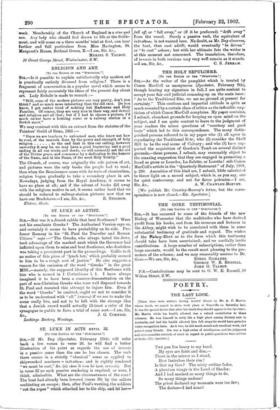ST. LUKE IN ACTS xxvu. 32. (TO THE EDITOR OF
THE " SPECTATOR:1 Sin,—If Mr. Day (Spectator, February 15th) will refer back a few verses to verse 26, he will find a better illustration of his point as regards the use of iszgesiy in a passive sense than the one he has chosen. The verb there occurs in a strictly " classical " sense as applied to shipwrecked mariners ix,3A shear, and is rightly rendered "we must be cast," &C. (il; 140014 IiTlYetliiiFie; 77 EgElY). But in verse 32 no such passive rendering is required, or even, I think, admissible. What are the circumstances of the case ? The boat had already been lowered (verse 30) by the sailors meditating an escape; then, after Paul's warning, the soldiers "cub the ropes" which attached her to the ship, and let her— fall of, or "fall away," or (if it be preferred) "drift away" from the vessel Surely a passive verb, the equivalent of iwAnilijeeel, is not wanted here. No doubt, as Mr. Day observes, the boat, thus cast adrift, would eventually "116 driven" or "be cast" ashore; but with her ultimate fate the writer is at this moment not concerned. The translation, therefore, of izrwEly in both versions may very weil remain as it stands.










































 Previous page
Previous page